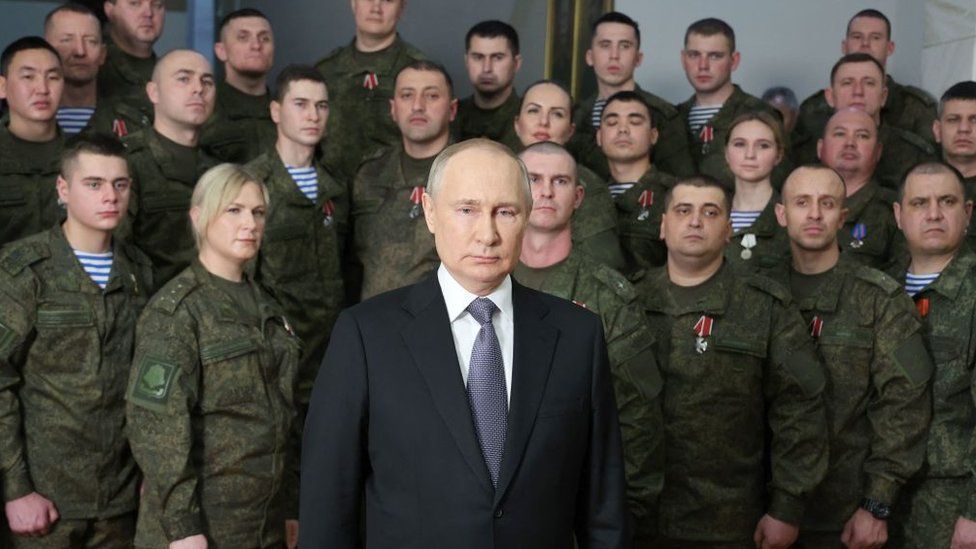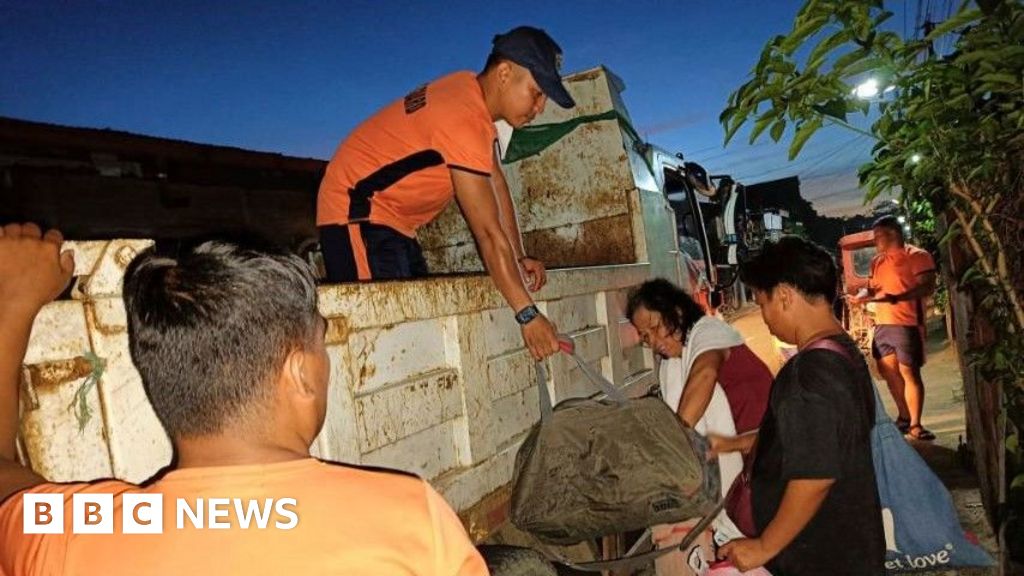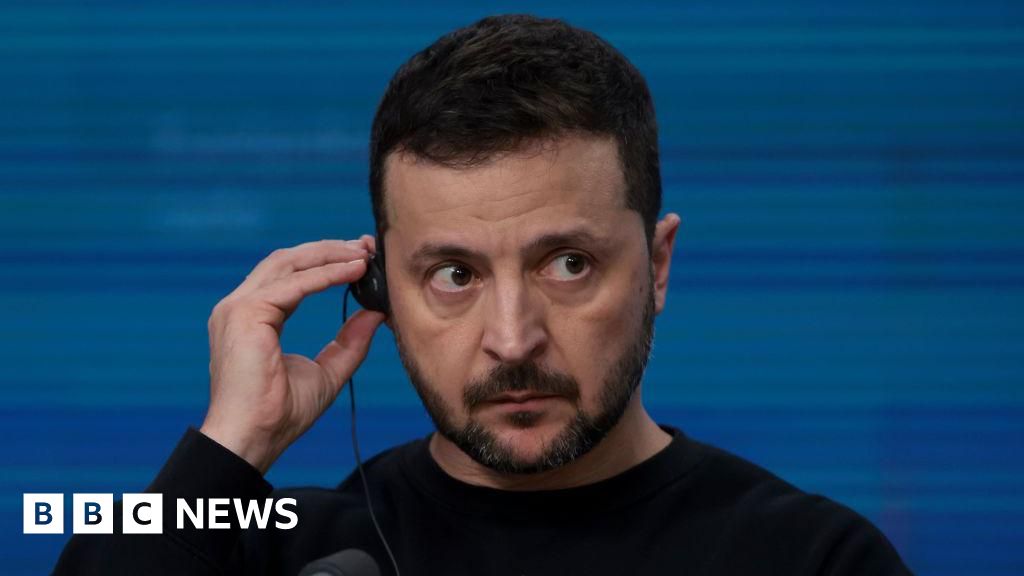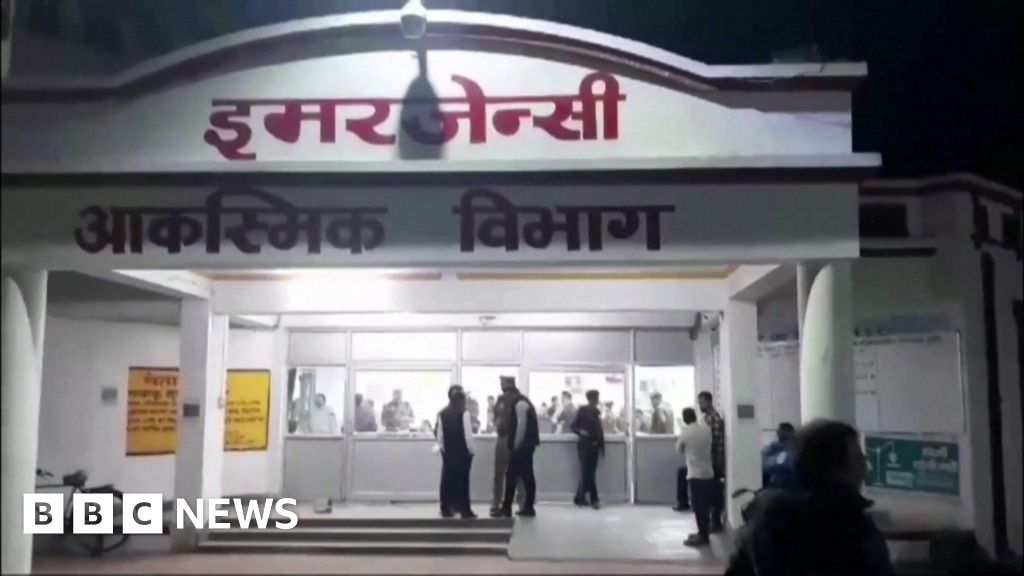ARTICLE AD BOX
 Image source, Getty Images
Image source, Getty Images
President Vladimir Putin delivers his New Year's address surrounded by people in uniform
By Steve Rosenberg
Russia Editor, Moscow
The clock in the Kremlin's Spassky Tower strikes midnight.
The Russian national anthem plays.
Then Channel One TV kicks off 2023 with a pop song: "I'm Russian and I will go all the way…I'm Russian, to spite the world."
Next on Top of the (patriotic) Pops: "I was born in the Soviet Union, I was made in the USSR!"
I change channels. At the Russia-1 New Year party, one of the station's most famous war correspondents is holding a champagne glass, toasting 2023 and wishing for "more good news than bad from the front line".
Sitting with him are men in military fatigues. A Moscow-installed official from Russian-occupied Ukraine declares: "I wish us all peace. But peace will only come after our victory."
You get the gist. This year's festive extravaganzas on Russian TV are a strange mixture of let's party and let's win on the battlefield.
This is not normal TV fare for a New Year's night in Russia. Then again, this is not a normal New Year's night. "Normal" disappeared ten months ago when Russia launched a full-scale invasion of Ukraine.
There was nothing "normal" about Vladimir Putin's New Year address to the Russian people. For his annual speech the president normally stands alone outside the Kremlin. This year, standing behind him, were men and women in combat uniforms.
In his speech last year, the Kremlin leader pointed out that "New Year's Eve is literally filled with good cheer and happy thoughts".
Good cheer and happy thoughts were in short supply this time round.
President Putin used the address to promote the Kremlin's alternative reality: that in this conflict Russia's the hero and Ukraine and the West are the villains.
"For years, Western elites hypocritically assured us of their peaceful intentions…but in fact, they encouraged the neo-Nazis in every possible way," President Putin said.
"Defending our Motherland is the sacred duty we owe to our ancestors and descendants."
When the Kremlin talks about "defending our Motherland", keep in mind that it was Russia that invaded Ukraine. Not the other way around.
Image source, Getty Images
The Russian President claims his country is benefiting enormously from the dramatic events of 2022: "It was a year of… important steps towards Russia's full sovereignty."
"We lay the foundation for our common future, our true independence."
The assertion that, in this war, Russia is fighting for its sovereignty and independence is puzzling, to say the least.
For a start Russia has long been a sovereign, independent nation. Even if you accept Vladimir Putin's premise that Russia never achieved "full sovereignty" the question arises: why not? Mr Putin's been in power for twenty-three years. Long enough, you may think, to sort that.
The other thing President Putin does in his new year address is to divide Russians into us and them, into those who support his "special military operation" and those who don't.
"It was a year that put many things in their place," the Kremlin leader said, "and drew a clear line between courage and heroism, on the one hand, and betrayal and cowardice on the other…"
In 2023 we're likely to see the Kremlin drawing this line ever more clearly. The Russian authorities have mobilised all the country's resources for the "special military operation".
There is no room for debate or discussion: the government expects the public to rally round and to support the president. Those Russians who don't will be made to feel they're betraying their Motherland.
Watch: Has the Ukraine war changed Russia?

 1 year ago
52
1 year ago
52








 English (US)
English (US)